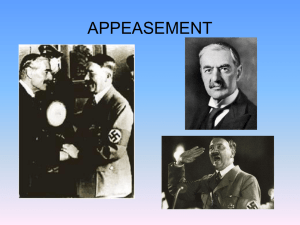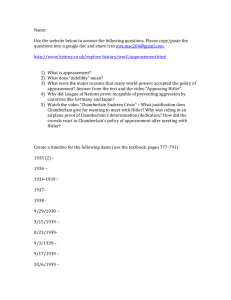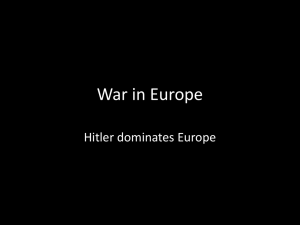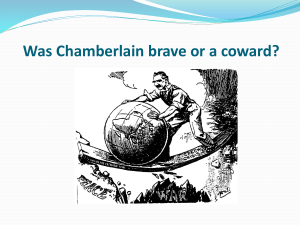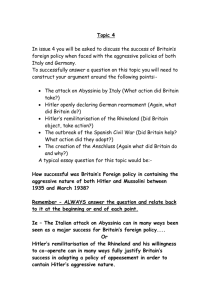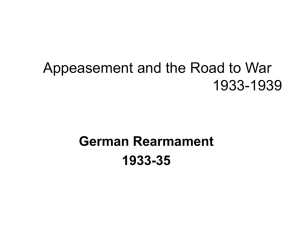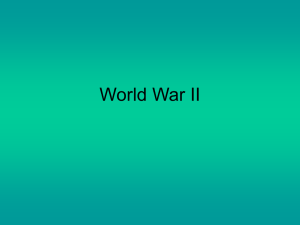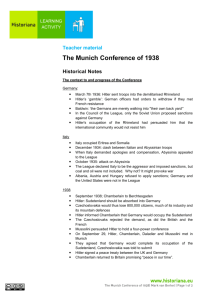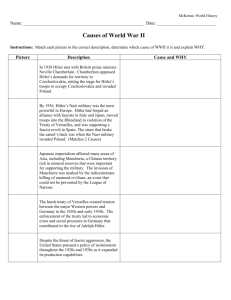British Foreign Policy 1929-39
advertisement
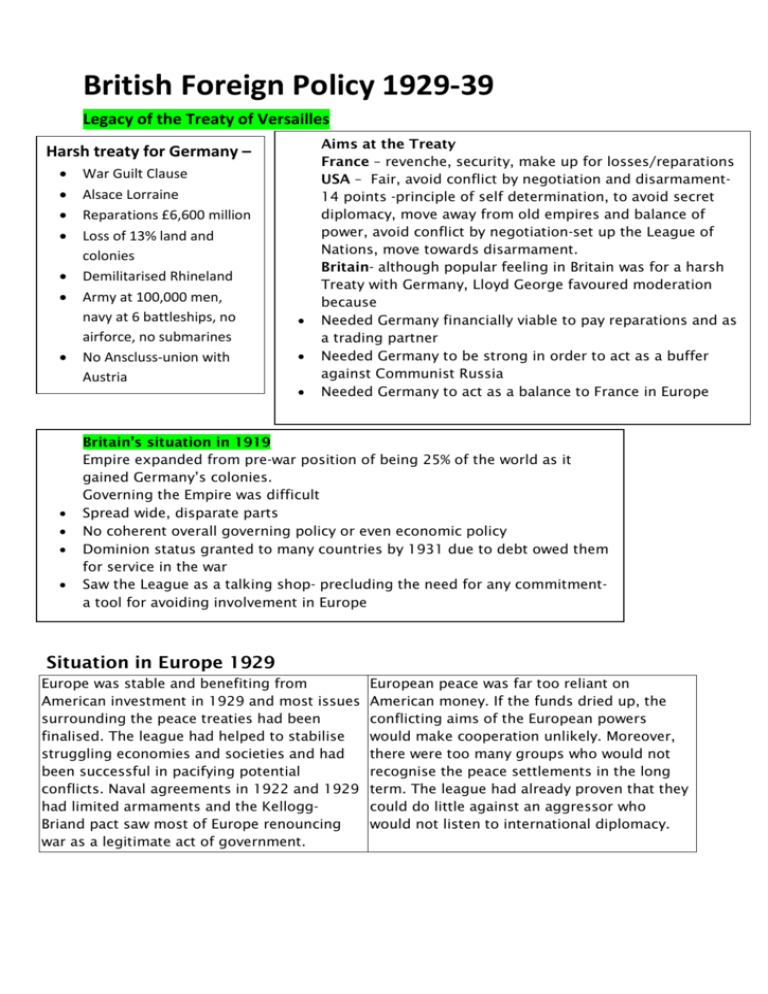
British Foreign Policy 1929-39 Legacy of the Treaty of Versailles Harsh treaty for Germany – • • • • • • • • • • • War Guilt Clause Alsace Lorraine Reparations £6,600 million Loss of 13% land and colonies Demilitarised Rhineland Army at 100,000 men, navy at 6 battleships, no airforce, no submarines No Anscluss-union with Austria • • • Aims at the Treaty France – revenche, security, make up for losses/reparations USA – Fair, avoid conflict by negotiation and disarmament14 points -principle of self determination, to avoid secret diplomacy, move away from old empires and balance of power, avoid conflict by negotiation-set up the League of Nations, move towards disarmament. Britain- although popular feeling in Britain was for a harsh Treaty with Germany, Lloyd George favoured moderation because Needed Germany financially viable to pay reparations and as a trading partner Needed Germany to be strong in order to act as a buffer against Communist Russia Needed Germany to act as a balance to France in Europe Britain’s situation in 1919 Empire expanded from pre-war position of being 25% of the world as it gained Germany’s colonies. Governing the Empire was difficult Spread wide, disparate parts No coherent overall governing policy or even economic policy Dominion status granted to many countries by 1931 due to debt owed them for service in the war Saw the League as a talking shop- precluding the need for any commitmenta tool for avoiding involvement in Europe Situation in Europe 1929 Europe was stable and benefiting from American investment in 1929 and most issues surrounding the peace treaties had been finalised. The league had helped to stabilise struggling economies and societies and had been successful in pacifying potential conflicts. Naval agreements in 1922 and 1929 had limited armaments and the KelloggBriand pact saw most of Europe renouncing war as a legitimate act of government. European peace was far too reliant on American money. If the funds dried up, the conflicting aims of the European powers would make cooperation unlikely. Moreover, there were too many groups who would not recognise the peace settlements in the long term. The league had already proven that they could do little against an aggressor who would not listen to international diplomacy. The State of the British Military in 1919 • At the end of the First World War Britain had the largest navy in the world, a brand new Royal Air Force (RAF) and an army that had enormously extended its technical, tactical and operational adroitness in warfare The Ten Year Rule • With peace seemingly assured, in 1919 it was decided that for planning purposes the armed forces should abide by the ten-year rule and not plan on fighting a major war for ten years. Hence immediate cuts in military spending were justified. Cuts in expenditure had to be made if Britain's external economic relations were to return to their pre-war range and extent, and it was deemed highly unlikely that there would be a serious threat to peace within ten years. • Expenditure dropped from £692 million 1919-1920 to £115 million in 1921-22 and conscription was abolished • The concept was also supposed to allow equipment programmes to be smoothed out over the medium-term, with an aim of having the armed forces ready in ten years. • Winston Churchill made the rule permanent in 1928, with the result that each year the tenyear clock would be reset back to year one; the armed forces would never get any closer to the ten-year target, so therefore there was no need to spend money on modernising them. 1932 Ten Year Rule was finally abandoned after Manchurian Crisis, but because the disarmament Conference was still in progress rearmament could not begin until 1934 Strategic difficulties within the military 1929-39 Constant arguments between Army, Navy and Air force chiefs as to who should have priority Issues • Which territories were under threat and from whom? • Was the Army, Navy or Air Force best suited to respond? • How did developing technology of warfare affect the way the armed forces should be used • Difficult to resolve in 1930s when Britain was under threat from Germany, Japan and Italy, with Germany as the main threat-recognised in 1934 1933 Defence Requirements Committee (DRC) was established to advise on strategy and rearmament DRC produced its first report in Feb 1934 and identified Germany as the ‘ultimate potential enemy’ pushing Japan and Naval considerations into second place. It recommended the establishment of an expeditionary Force, but the cabinet felt that public opinion would be hostile to this. So priority was given to the RAF, which Neville Chamberlain (Cabinet’s dominant figure) saw as the best deterrent against Germany. Nov 1935 DRC reported again. Hitler’s rearmament programme now public knowledge. Abyssinian crisis had turned Italy from a potential ally to a threat. Stated ‘It is a cardinal requirement of our National and Imperial security that our foreign policy should be conducted so as to avoid the possible development of a situation in which we might be confronted simultaneously with the hostility of Japan in the Far East, Germany in the West, and any power on the main line of communication between the two’ March 1936- formed 4 Year Plan for rearmament which Chamberlain accelerated when he came to office, 1937. £185 million 1936-£719 million in 1939 RAF Defence White Paper1935- strategy determined as role of RAF was to defend London from ‘Air Peril’ Bombers to attack German cities in retaliation To avoid sending troops into Europe at all costs 1934-38 Technological advances meant that Fighter planes (Hurricanes and Spitfires ) came into existence Radar stations were installed along the South coast This meant that bombers could be intercepted before they had a chance to drop their bombs on civilian populations Dec 1937 Sir Thomas Inskip, Minister for the Co-ordination of Defence, reported on a new strategy that; • Priority was now given to fighters • Still a defensive strategy-to protect Empire and trade • Dovetailed with appeasement After all estimates of German air strength were frightening-in first 6 months of fighting 600k dead and 1.2 million wounded (infact only 65k in entire war) Eden resigns in 1938 with despair at this continued policy of appeasement. Although estimates of Air strength were overestimated and the amount of damage the German Lufftwaffe could inflict was also overestimated the policy of appeasement did buy Britain time. By 1940 Britain narrowly won the Battle of Britain because the effective strength of her fighter command was 10x as strong as in 1938 and her radar installations were virtually complete. Army • • • • Navy Britain’s principle service • role to protect the trade route (Japan+ Manchuria, Abyssinia) • To defend the territories of the Empire However, its effectiveness was diminishing because it -did not have enough funding-treasury were penny pinching and Neville Chamberlain was Chancellor of the Exchequer for 1931-37 and convinced that Britain could not do anything more than ignore Japanese expansion -International treaties restricted its growth in relation to other countries -Washington Treaty of 1922 set a ratio of,5,5,3,1.67 for battleships giving equality with the USA plus a ban on building new battleships for ten years -1929-30 London Treaty set the ratio for cruisers and destroyers plus a further ban on building for another 5 years -Tactical thinking was conservative-the threat to warships from planes was underestimated and insufficient emphasis was given to the construction of aircraft carriers. By 1939 only had 6 aircraft carriers-4 of these were converted warships -1931 Manchurian Crisis-Japan, who had been regarded as Britain’s most likely enemy by the Navy, was now cause for concern in political circles and resulted in the abandonment of the Ten Year Rule and recommencement of the building of the Naval base in Singapore -1934-Hitler over took Japan -1935 Anglo German Naval agreement brought relief from the increasing pressure from Italy and Japan. It restricted Germany’s fleet to 35% of the Britishbeneficial as it was assumed Germany would be building a fleet anyway -1939 Italy had pushed Japan to third place in Britain’s list of enemies and the commitment to defend the Far East had been tacitly abandoned The Army had seen cuts in its numbersWWI commitment to attrition was seen as a huge mistake Somme and Paschendale were remembered rather than the victories of 1918 Generals, like Haig, were seen as out of touch, insensitive and ignorant. Officer classes were continued to be drawn from a narrow upper-class social group, who prized sporting rather than intellectual achievement Strategy-Confused-dominated by in-fighting-uncertainty about the role of mechanised vehicles/ units in modern warfare • The Munich Agreement 1938 bought Britain a little time according to the Chiefs of Staff but • Feb 1939 before Cabinet agreed to raise an army of 32 divisions to fight in Europe • March 1939 before TA doubled in size-April before conscription brought in • By this time Germany was able to plunder and exploit Czechoslovakia instead of fighting against her as would have been the case in 1938 ‘Britain entered WW2 without an effective armoured force, lacking in clear ideas about tank warfare, and with vehicles with severe design and operational limits’ Edward Ranson; British Defence Policy and Appeasement between the Wars1919-39 Economic problems facing the government. The Great Depression Situation in Britain worsened Exports fell Unemployment rose to almost 3 million The Pound was forced off the Gold Standard 1931 The National Government was formed to deal with the crisis They feared rash economic policies would make things worse The ‘Fourth Arm of defence’ Treasury. Officials maintained that the economy was the ‘Fourth Arm of Defence’ It was essential to have a healthy economy to be ready for war. Britain depended on imports for food and raw materials They needed a healthy balance of payments to buy these Rapid rearmament would lead to a balance of payments deficit A balance of payments deficit would lead to a rush on the pound as was seen in 1931 Britain would be left with a weak pound and few reserves Britain would not survive the war without becoming bankrupt within a few months Option available-Economic Appeasement Foreign Office memorandum Jan 1936 ‘If....we believe that Nazism is in reality a symptom and not a cause, then it is logical to deal- or to at any rate attempt to deal- with it by attacking the cause itself. And what is the cause? Obviously, economic distress’ The Impact of the first world war • Accelerated Britain’s economic decline • Industries such as Cotton and Textiles Ship building Coal • Unemployment never below 1 million • Debts Britain had lent £1,5 million to her allies, mainly France and Russia (cancelled debts after the revolution) Britain had borrowed £1.3 billion from the USA- USA demanded repayments after the war Dilema The quick rearmament required to keep up with the dictators would bankrupt the British economy Slow rearmament, based on only what the country could afford might mean that Britain’s military would not be strong enough to withstand an enemy attack Legacy of the Ten Year Rule -Shrinkage in Iron, Steel and Ship building industries as domestic orders had dried up. -When rearmament was finally decided on the munitions industry had shrunk in terms of capacity -There were not enough skilled munitions workers to cope with the increase in demand -Forced transference from the large numbers of unemployed (not skilled enough) or consumer industries (this amounted to interference in the economy) was not an option because the National Government preferred traditional economic measures of laissez faire to ensure economic growth Chancellor of the Exchequer 1931-37, Neville Chamberlain, played an important part in foreign policy even when he was at the Treasury. • He believed that economic policy was vitally important to the solution of Europe’s diplomatic problems • Treaty of Versailles was too harsh on Germany and that German aggression stemmed from economic difficulties caused by the Treaty • If Chamberlain, and British Diplomacy could secure the return of Germany’s colonies and industrial areas Germany would have no need to go to war. Chamberlain’s interpretation of German Internal PoliticsHitler had two sets of internal advisors Moderates- Schacht -German Economic Minister- share the British view on how to solve Germany’s problems Extremists (name given by the British) were determined to make Germany stronger by conquest and war Feb 1939 Chamberlain still held this view and argued that a mutually beneficial Anglo-German economic agreement could help avoid recession and rising unemployment in Britain-a stronger Germany would restore the trade links between Britain and Germany German Internal politics Hitler was not under the influence of ‘moderates’ Schacht had resigned from the Economics Ministry in 1937 because he could not restrain Hitler Hitler was determined that the German economy should be ready for war by 1940. British Foreign Policy Stanley Baldwin Prime Minister 1935-1937 Aware of British weakness and acting on advice of DRC- tried to avoid crisis. He and Macdonald acquiesced to Hitler’s reintroduction of conscription and remilitarisation of the Rhineland, attached little importance to the Stresa declaration, signed a naval agreement with Germany, which upset the French, did little to stop Mussolini taking Abyssinia (but enough to lose his friendship),stayed out of the Spanish Civil War thus giving the dictators a free hand. Followed public opinion rather than mould it? Duty of democratic politician? Government seemed to be reactive rather than influencing events Chamberlain 1937-1940– Background • In May 1937 Stanley Baldwin retired and Neville Chamberlain became Prime Minister • His brother and Father had both been in politics • Chamberlain was patriotic, proud of the Empire and determined in his principles. He was less compromising than Baldwin and often ignored members of his cabinet who did not agree with him. Chamberlain – Opinions and Aims • Opinion on war – “Wins nothing, cures nothing, ends nothing.” • He had a business background and so believed in face to face negotiation. He had no confidence in the League of Nations or disarmament conferences. He believed settlements could only be reached if statesmen meet man to man and reach a compromise – just like a business deal. • Took much more responsibility for foreign policy than Baldwin. Aims- to produce a ‘Grand Settlement’ a ‘lasting European Peace’ through Britain involving France, Italy and Germany. Assumed Hitler was a reasonable man. Assumed he could get a good deal with Germany possible involving the return of colonies, an air pact and some resolution of Germany’s grievances in Eastern Europe. • Wouldn’t make any firm guarantees to France • Did not trust USSR • Thought Mussolini might restrain Hitler • 1938 early Eden, Foreign Sec resigned-in agreement with appeasement although opposed • Negotiations with Mussolini- because Chamberlain determined to conduct foreign policy himself. • The Anschluss (union with Germany) in 1938 was a shock to Chamberlain but he accepted it. He saw it as a positive in resolving the grievances of Hitler and the German Austrians, he only wished that he had orchestrated it instead of Hitler just marching in. Chamberlain needed a hold over Hitler and there was no sign of one at that stage. • Czechoslovakia – Some politicians saw CZ as the jewel in the crown of Europe. It was a democracy surrounded by dictatorships and it treated its racial minorities with equality which was rare even for Britain. Surely, in a symbolic sense, it was worth fighting for. Chamberlain called CZ a “highly artificial creation.” He sympathised with the Germans who were being forced to live in this creation. Appeasement Berchtesgarden 15th Sept 1938 In September 1938 Chamberlain decided to initiate Plan Z. With the German invasion of CZ looking inevitable he decided to fly for the first time in his 69 years and meet Hitler in Germany. No other British statesman had done this before and Chamberlain saw it as a gesture of his genuine desire for a personal and political friendship with Hitler. Hitler probably saw it as a symbol of Chamberlain’s desperation. Godesberg – 22nd September 1938 Chamberlain had convinced the French and the Czechs to agree to Hitler’s demands for the Sudetenland. Chamberlain told Hitler this at Godesberg. Hitler was furious that Chamberlain had called his bluff and delivered on his demands. He demanded that Germany should be allowed to take the Sudetenland by force by the 28th September –sooner that originally agreed and that it was not to be supervised by an international commission. The French, Czechs and most of Parliament were outraged by Hitler going back on his own terms and using bully tactics but Chamberlain still wanted to give Hitler what he wanted. Maybe this should have been a turning point in appeasement; Chamberlain could have concluded after Godesberg that Hitler could not be reasonable. Munich-29-30th September : Mussolini offered a four power conference in Munich to try and resolve the issue 29-30th September. Hitler reluctantly agreed to delay the occupation of the Sudentenland until 10th October and to allow an international commission to map the boundary line. He also consented to guarantee the independence of the remainder of Czechoslovakia and signed a declaration that ‘Britain and Germany would never go to war with one another again’. The Peacemaker 28th Sept Munich Conference another opportunity for peace. Chamberlain returned with a guarantee • to delay occupation to 10th Oct • To allow overseeing by international commission • ‘for our two nations never to go to war again’ Greeted as hero by press and people-bombarded with letters of congratulation (over 40,000) and gifts Parliament-strong criticism from Winston Churchill, Atlee and others. Although the government won the vote the debate was regarded as lost. • 28th Sept Chamberlain says in a radio broadcast to the nation indicates reluctance for conflict ‘How horrible, fantastic, incredible it is that we should be digging trenches and trying on gas masks here because of a quarrel in a far-away country between people of whom we know nothing...war is a fearful thin, and we must be very clear, before we embark on it, that it is really the great issues that are at stake’ Presaged a change in tone for the population A change of policy Halifax took the lead in urging a tougher policy Jan 25th 1939 he warned that Hitler might attack in the west 1st Feb Cabinet agreed that Britain must go to war if Germany invaded the Netherlands or Switzerland and agreed to staff talks with France. 6th Feb Chamberlain declare ‘any threats to the vital interests of France from whatever quarter it came must provoke the immediate co-operation of Great Britain’ 20th Feb argued that home defence might have to include a share in the defence of French territory 22nd Feb Cabinet agreed to prepare for an army of eight divisions for dispatch to the continent. Press now feared that far from being limited in aims Hitler was now ultimately desirous of domination in Europe and he might have to be stopped. (Chamberlain still thought Hitler could be stopped without war- now that the democracies were better prepared he would be deterred-how wrong he was!) FOR CHAMBERLAIN Appeasement just affected the timing of the war Not Guilty -He followed rational policies and could not have predicted Hitler’s potential. -The policy avoiding confrontation is a deep rooted British tradition. He saw himself as the man to nobly settle Europe’s dispute after 1919. -Germany had legitimate grievances. Justice does not become injustice because it is demanded by a dictator. -Britain was not ready for war in 1938. It had no antiaircraft defence and few fighter planes. The Czechs were divided and their defences were not complete. Neither the French nor the British could mobilise in time to help the Czechs. Chamberlain knew Hitler’s unpredictability but he could not throw the German leader out of office, his only option was to work with him. -The British public would not accept war in 1938. -Britain did go to war but it could have been worse. In September 1939, Britain and France were firmly united and together had more tanks and troops than Germany. They hoped Poland would keep Germany busy until the spring of 1940 and Italy and Japan had not yet given their alliance to Germany. The British people were united behind a war which seemed an impossible prospect in 1938. Chamberlain’s efforts showed people that Hitler had to be stopped. Most recent historians see Chamberlain as helpless rather than guilty. If Hitler was as reasonable as Chamberlain then the appeasement might have worked. It was Hitler’s ambition not Chamberlain’s mistakes that caused the war. AGAINST CHAMBERLAIN Appeasement was a cause of the Second World War Guilty -Why did Chamberlain appease a man who made no secret of his aim to dominate Europe? -Each surrender gave Germany and Hitler more land, more defences, more men, more armaments and more confidence. -Germany was militarily far weaker in September 1938 than she turned out to be in September 1939. The Luftwaffe (air force) could not reach Britain, the French army was larger and the Czech border defences were very strong. Hitler was short on tanks, fuel, ammunition, trained officers and reserves. War in 1938 with CZ on Britain’s side would have been far better than war in 1939. -Some historians blame Chamberlain for not following his policy through to the end. He should not have made a deal with the Polish right wing dictatorship. They were not worth risking a major war over and Poland would not have made Germany any stronger. The takeover of Poland would have just bought Germany face to face with Russia.-Chamberlain could have encouraged Hitler to expand towards Russia and declare war. The most obvious argument against Chamberlain is that he failed. In September 1939, Britain was forced into a war in which she had little to gain and everything to lose. Attempts to secure international agreement on disarmament. One of the major aims of the League of Nations was to devise an acceptable world disarmament programme. Disarmament is linked to security – a state will only disarm if it feels secure. The Washington Naval Convention 1922 halt to ship building for 10 yrs ratio of 5:5:3:1.67 Br:USA:Japan: Italy:France for capital ships Four Power Treaty 1922 respect possessions in Pacific refer any dispute out of the agreement to conference between Br France Japan and USA 1924 Geneva Protocol for collective security was drafted. Tried to commit each member of the League to coming to the aid of another League member if they were in the same continent. An aggressor was defined as any country that refused to accept arbitration. Britain rejected this as it would be committed to policing the world given the size of its Empire (MacDonald lost election new Govmt. refused. Failure demonstrates how national self-interest took priority over international co-operation) Kellog –Briand Pact 1928 rejected war as an instrument of national policy 15 signatures by 1933 further 50 had joined London Naval Conference 1929 Agreed to extend the principle of Washington Naval convention to smaller fighting ships World Disarmament Conference 1932 -34 held at Geneva, convened by League-main powers Gm, Fr, Br. Gm main driving force behind the conference, now a member of the League, Gm called for a revision of ToV and got agreement on the ‘equality of rights’ within a system which would ‘provide security for all nations’ = equality of armaments. Conference failed, Germany walked out. Manchurian Crisis highlighted weakness of the League, rise of nationalism in Germany made France +Poland less likely to compromise over German demands for equality of armaments, impact of Depression meant increasing isolationist tendencies Public Four Poweropinion Pact 1933 proposed by Mussolini aimed at revising ToV through joint agreement of the Great Powers- France failed to ratify PUBLIC OPINION Rearmament Popular in Britain? Not a popular policy-East Fulham by-election of 1933 Cons lost 14k majority, turned to 5k defeat to Labour on issue of rearmament. 1935 peace Ballot, advocating international disarmament endorsed by more than 11 million people 1935 Stanley Baldwin ran for election ‘I give you my word there will be no great rearmaments’-even though he planned some. MacDonald and Baldwin were concerned about public opinion. Baldwin was thinking about the unemployed. Aware of the popularity of the League of Nations he created a Minister for League of Nations Affairs in 1935 (Peace Ballot in 1935). There was ‘never again’ attitude after the horrors of the First World War summed up in the Oxford University Union debate of Feb 1933 ‘This house should not vote for King and Country’ Public opposition to rearmament held the process back-plus it might also antagonise Hitler. Guernica’s destruction by German bombs fuelled fears that the next war would be terrible for civilians and that bombers would ‘always get through’- made a deep impression. Chamberlain saw this for himself in his first time flight over London in 1938. He describes the British Empire as ‘a very rich and very vulnerable Empire’ The search for collective security -1920s saw Britain and France signed up to the League and its commitment to maintaining peace through arbitration in case of conflict and a push towards world disarmament, although Britain preferred to view the League as a ‘talking shop’ and was reluctant to commit herself militarily - 1924 Geneva Protocol was not signed up to because it would essentially commit Britain to policing the world. She had commitments in each continent through Egypt, Abyssinia, the Middle East, Portugal, the entire Commonwealth and Empire which included Australia and New Zealand as well as India and Singapore, large areas of Africa and the Caribbean. -Locarno 1925, Britain did agree to act as a policeman in Europe, with the League as arbitrator in case the Locarno Treaty is violated-1929-The high point of collective security. Britain recovering economically from the war, Europe stable, with France, Germany and Italy working together to reasonably revise the harshness of Versailles -1931- the Manchurian Crisis- reveals the weakness of the League in the Far East. No country is willing to commit to following up the Leagues condemnation of Japan’s actions with force -1934 Four Power Pact-an attempt to revise the treaty of Versailles with the Great Powers-FR, GM, Br and Frrejected by France -1935 The Stresa Conference- a turning point- Britain lose an ally through poor diplomacy and Italy align herself with Germany- Italy now joins Japan as a threat to ‘The Empire’ competing with Britain in the Mediterranean -1937- Abyssinia- reveals the League’s weakness, this time in Europe, sanctions are the only force the League has. The idea of collective security is smashed as the threats to Britain’s security increase. The aggressive dictators are joined in the Anti-Comintern Pact having demonstrated their strength in supporting General Franco in Spain. On 23 June 1936, Stanley Baldwin told the House of Commons that collective security had "failed ultimately because of the reluctance of nearly all the nations in Europe to proceed to what I might call military sanctions ... The real reason, or the main reason, was that we discovered in the process of weeks that there was no country except the aggressor country which was ready for war ... [I]f collective action is to be a reality and not merely a thing to be talked about, it means not only that every country is to be ready for war; but must be ready to go to war at once. That is a terrible thing, but it is an essential part of collective security." Appeasement was the new policy Analysis of British foreign policy Contradiction• left alone, undisturbed by continental Europe, to make secure the immense British Empire and focus on British trade. • Avoid alliances at all costs-diplomatic liability • Adopt an increasingly isolationist outlook BUT • Not prepared to abandon influence and prestige • Moral duty to intervene in world affairs • and to put them right when it was necessary to do so Ad Hoc policy -flexible and pragmatic approach. Some problems confronted (Czech, Lausanne), others ignored (conscription-Stesa, Rhineland, Austria-protest) Impression- British policy was incoherent, indecisive and unpredictable Three major concerns • revision of Versailles to mollify Germany • public opinion • extensive global commitments and military and economic weaknesses
